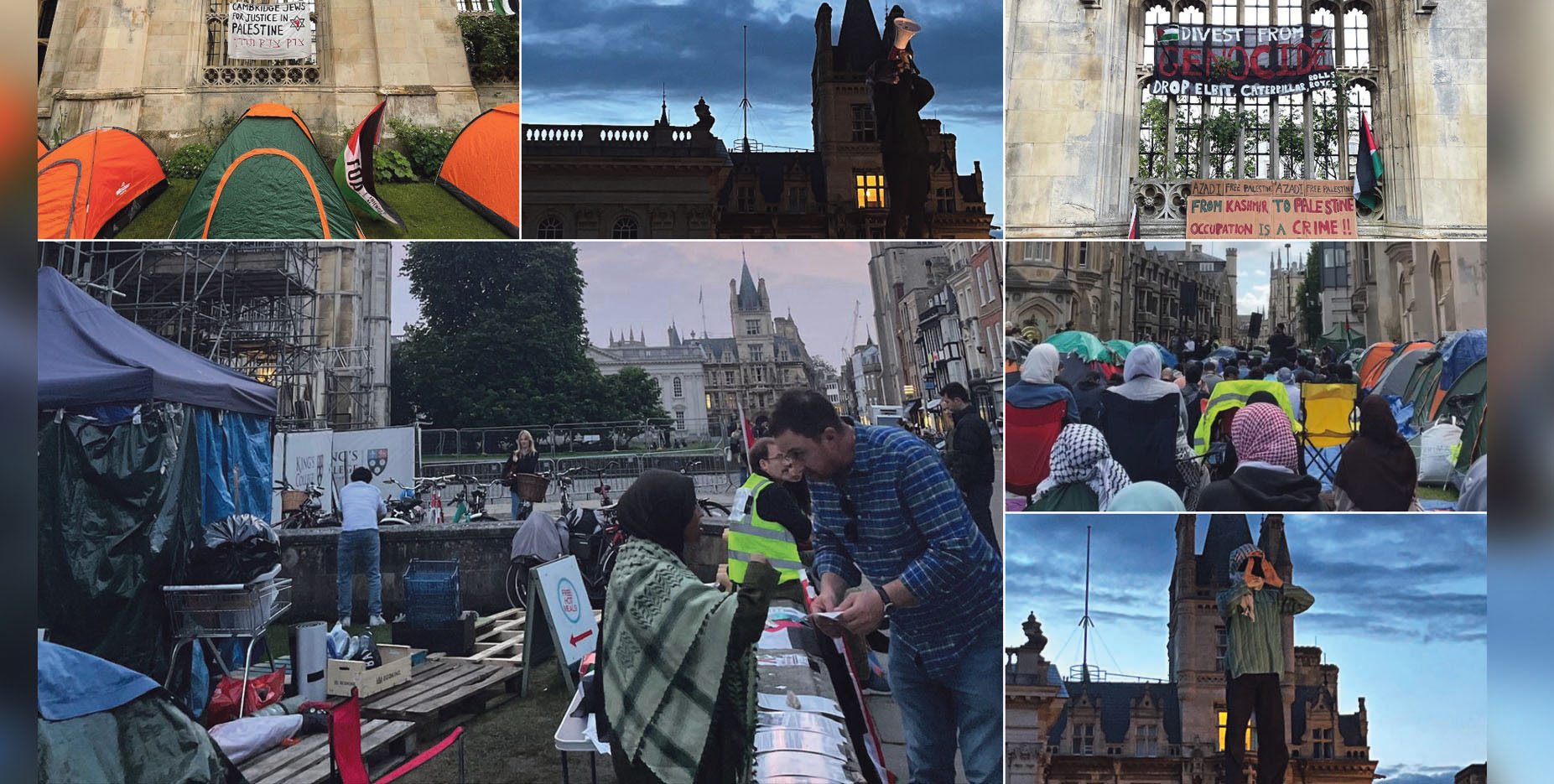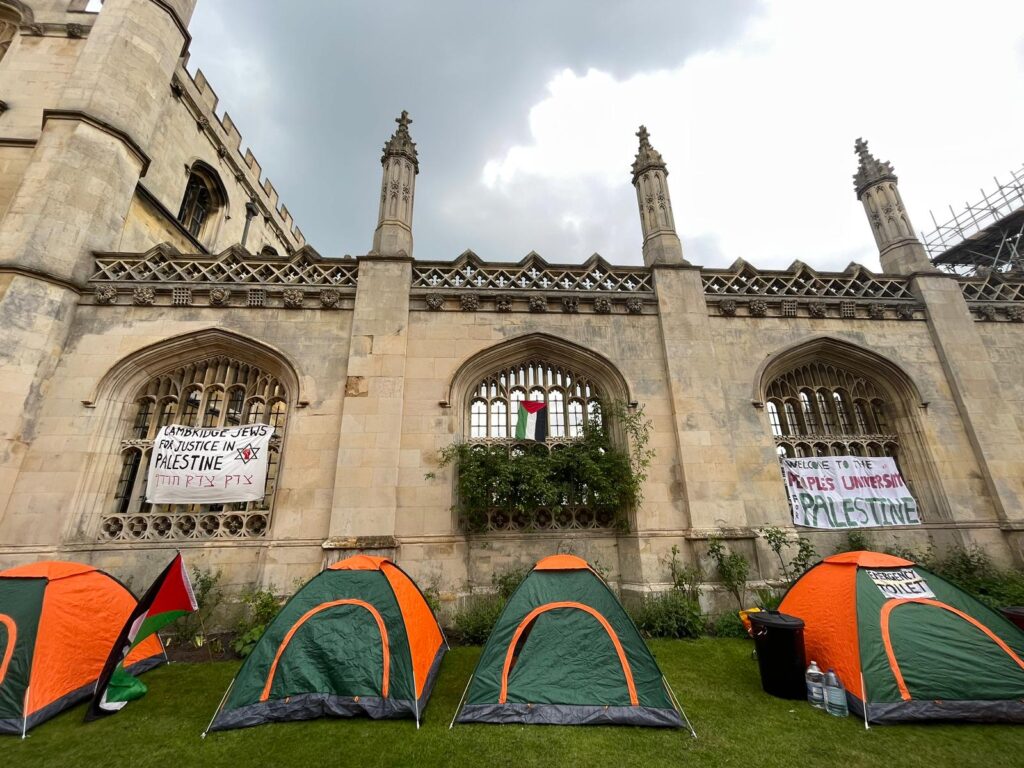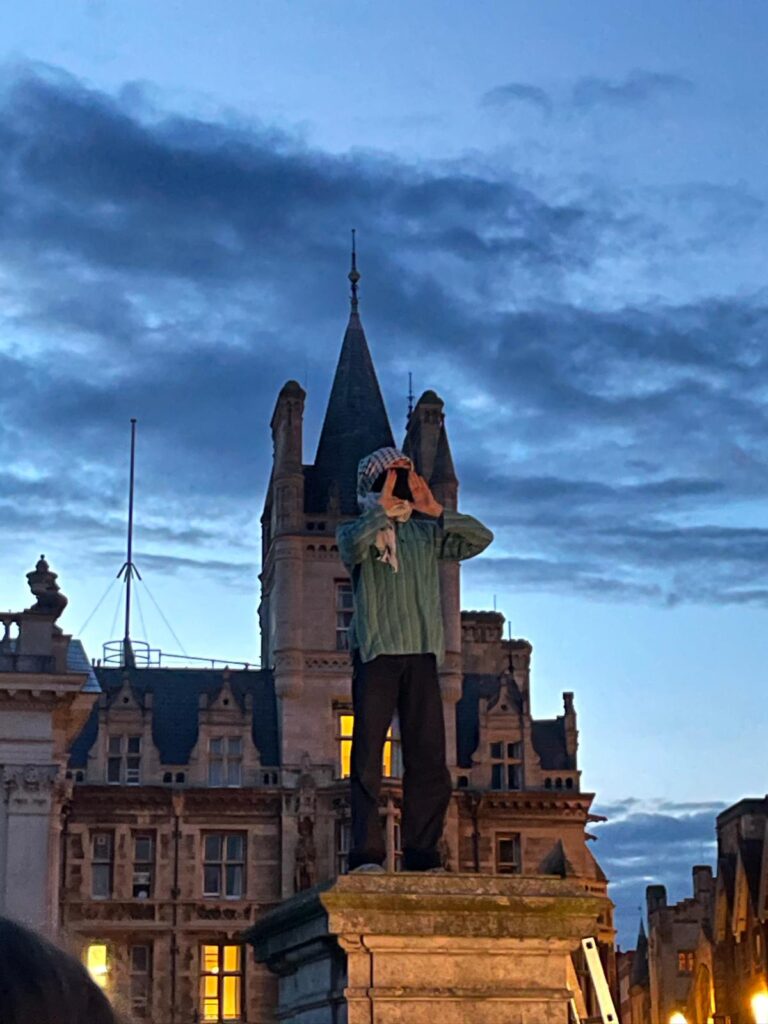
Sahar Mulji, Human Social and Political Sciences Student, University of Cambridge
It’s a cool spring day in Cambridge, and the cobbled streets, lined with old buildings, quaint shops and cafes, are filled with the hum of tourists, students, and locals. In the centre of town, along Kings Parade, stands the majestic King’s College, renowned for its grand Gothic architecture and stunning stained-glass windows, now adorned with Palestinian flags and handmade signs which read “Divest from Genocide,” “Occupation is a Crime,” and “Welcome to the People’s University for Palestine.”
There are over forty tents laid out in rows, spanning the length and width of the lawn outside the college. Students at the University of Cambridge set up the camp in the early hours of the morning on May 6—the same day that Israel commenced the invasion of Rafah.
They joined a global movement made up of thousands of students who have erected similar set-ups across 36 different UK universities. They are resolute—refusing to learn about human rights, social justice and democracy in the lecture halls while a genocide takes place in the real world. They are determined to hold the institutions they attend accountable for their complicity.
More than 5,000 Palestinian men, women and children have been massacred since the encampment at Cambridge began, bringing the total number of fatalities to over 38,000 since October 2023. Indeed, the journal Lancet recently estimated that the final death toll could be around 186,000. Israel has bombed tents and shelters with displaced Palestinians inside them, forced out of their homes once again and millions remain trapped and on the brink of starvation.
UK universities collectively invest nearly £430 million in companies complicit in Israel’s egregious war crimes and mass atrocities. The University of Cambridge has partnerships with the defence industry, including companies such as Rolls Royce, BAE Systems and Caterpillar, worth over £46 million. Between 2002 and 2020, the university received a minimum of 2568 research grants totalling over £109 million from arms manufacturers and military bodies.
The students’ demands are clear: that Cambridge University disclose all its relationships with companies and institutions complicit in the ongoing ethnic cleansing of Palestine, that it terminates all such relationships, reinvests those funds to support Palestinian students and scholars, and commits to protecting academic freedom. And they refuse to move until these demands are met.
First and foremost, the camp exists as a space to centre on the Palestinian experience and struggle. Every day, the encampment hosts various lectures and teach-ins on a variety of topics, including Palestinian history, culture and resistance, as well as a diverse range of struggles, from migration and justice to the occupation of Kashmir and the Kurdish Liberation Movement.
A daily news bulletin is read out each evening to update on the ongoing atrocities being committed in Gaza, and vigils are held in the evenings to commemorate the lives of those martyred. Protests start and are led from the encampment, drawing hundreds of students on the daily, as cries of ‘I will return’ in Arabic-, and shouts for peace, justice and liberation for Palestine can be heard throughout the streets of Cambridge.

Photo: Students established a pro-Palestinian encampment on King’s Parade at Cambridge University on May 6—the same day that Israel commenced the invasion of Rafah. (Credit: Sahar Mulji)
Night and day, come rain or shine, the community remains; present, steadfast, and growing. The camp is bustling; every day a communal breakfast, lunch, and dinner are served, donated by an individual or organisation based in Cambridge. Students revise for their upcoming exams and write their dissertations in the ‘study space’, while others browse the array of books on past resistance movements and emancipatory struggles that make up the ‘Liberation Library’.
The camp is a vast, monumental undertaking; each member of the camp has a code name, and there are dozens of sub-teams, each focused on a different aspect of the camp’s operations. The space has evolved and grown over the last two months and now has a communal seating area, a game space, a mini-football pitch, as well as a community garden that grows a variety of plants that are widely found in Palestine.
The beauty and collective power of such a space is difficult to express. It has brought together individuals of all backgrounds, ethnicities and religions in solidarity and shared commitment to peace and universal justice. On Fridays, Jumu’ah prayers are held at the encampment on Kings Parade, in which up to fifty students stand outside side by side in prayer whilst passersby look on. The Khutbahs discuss at length the Islamic obligation to remain politically engaged, and to take an active stand against oppression and injustice.

Photo: Students established a pro-Palestinian encampment on King’s Parade at Cambridge University on May 6—the same day that Israel commenced the invasion of Rafah. (Credit: Sahar Mulji)
A few hours later, the camp prepares for Friday Night Shabbat dinner – led by ‘Cambridge Jews for Justice’, a group made up of Jewish students in Cambridge set up to oppose Israel’s genocide against the Palestinian people. The service consists of prayers, songs and readings which oftentimes echo the themes and calls for justice and freedom expressed in the Khutbah earlier on in the day. The circle then breaks as it approaches Maghrib and Isha time and Jama’ah prayers are held once more. There exists nothing like this. It is only here – a space in which people are brought together in grief, in anger, in hope – that the networks of solidarity constructed are so far-reaching, powerful, and sustained.
Encampments across the UK have deployed collective resistance to force the hands of universities and other institutions. In direct response to the student protests, Trinity College Dublin, Queens University Belfast, Reading University, Goldsmiths University of London, and the University of York have all formally committed to divestment. At Cambridge, efforts to escalate action saw the encampment spread to the lawn outside Senate House, two days before graduations were due to take place there. This successfully forced the university to come to the negotiating table, and the encampment now has regular meetings with university administrators.
However, Cambridge University is yet to formally address its students’ demands. Indeed, rather than choosing to address its demands, UK universities have overwhelmingly chosen to target those taking a stand against the genocide instead. They have chosen to prioritise profit over Palestinian lives.
Over the last few months, students across the UK have faced heavy police violence and intimidation, media harassment, threats of disciplinary action, as well as legal action to evict them from their own campus. In June, LSE was granted an Interim Possession Order – and legal threats have seen the encampments at the University of Leeds and the University of Oxford come to a close.
And yet, the movement is only just beginning. The encampments are merely one manifestation, a singular iteration of the sustained and robust networks of solidarity and resistance built. We have witnessed the growth of the largest, most expansive mass movement for Palestine in history. Each, and every encampment has succeeded in forcing institutions to place Gaza and conversations around divestment on the agenda, and in cultivating clear openings for further pressure. Hundreds and thousands of students, staff, workers and members of the wider public have rallied around a collective vision for a fairer, liberated world.
The encampment is not a physical space or architecture; it is a community that exists in our hearts and minds that can never be erased; a community that is a testament to what is possible when we unite and put a cause above all else.
We continue to stand proud and stand strong. We have seen what could be. Our movement is growing. We’re not going anywhere. We will not rest until Palestine is free.
READ MORE | GAZA SIEGE | SPECIAL COVERAGE
New Govt takes baby steps on Palestine as Labour loses Muslim voters
Editorial: New Government, fresh promises, but little real change
Editorial: Labour’s landslide victory: a triumph in seats, not hearts
Biden Administration loses twelfth key appointee amid controversy over US Gaza policy